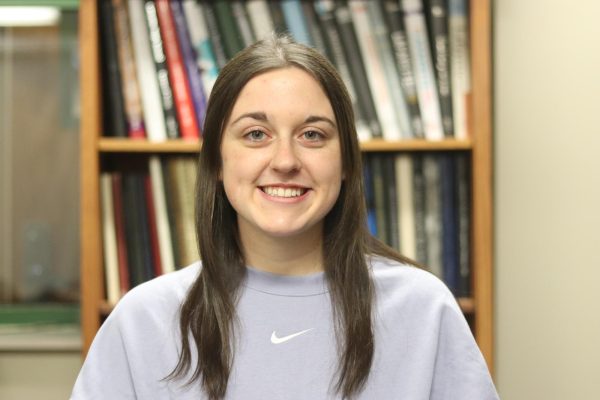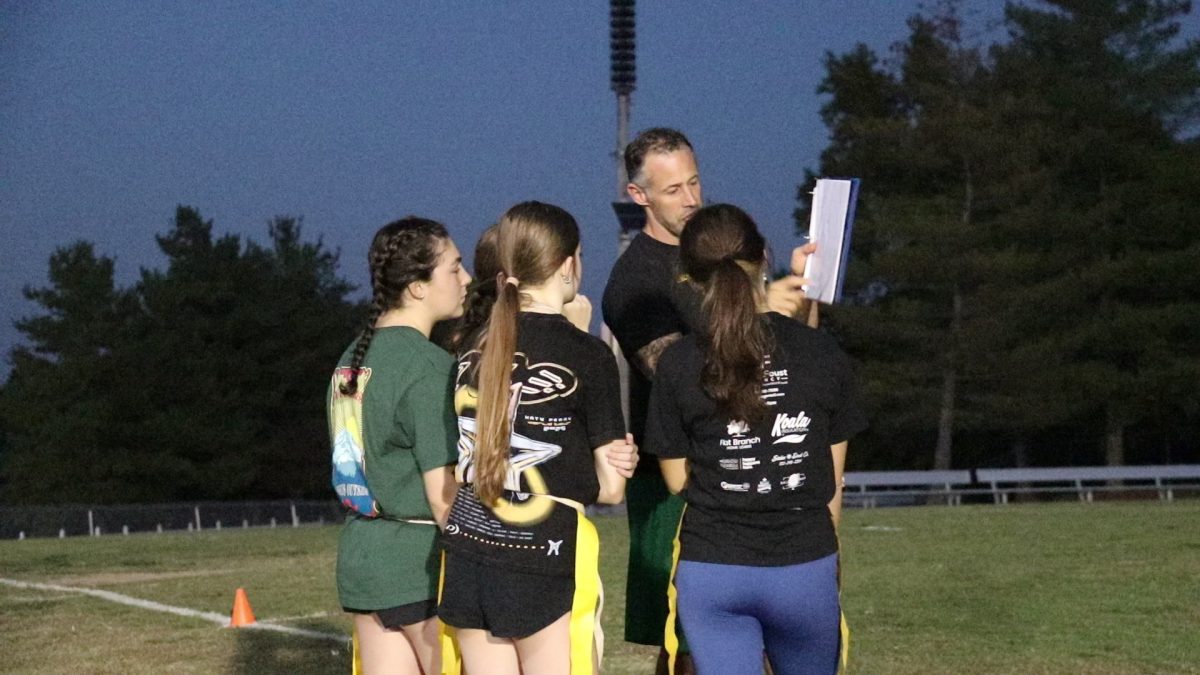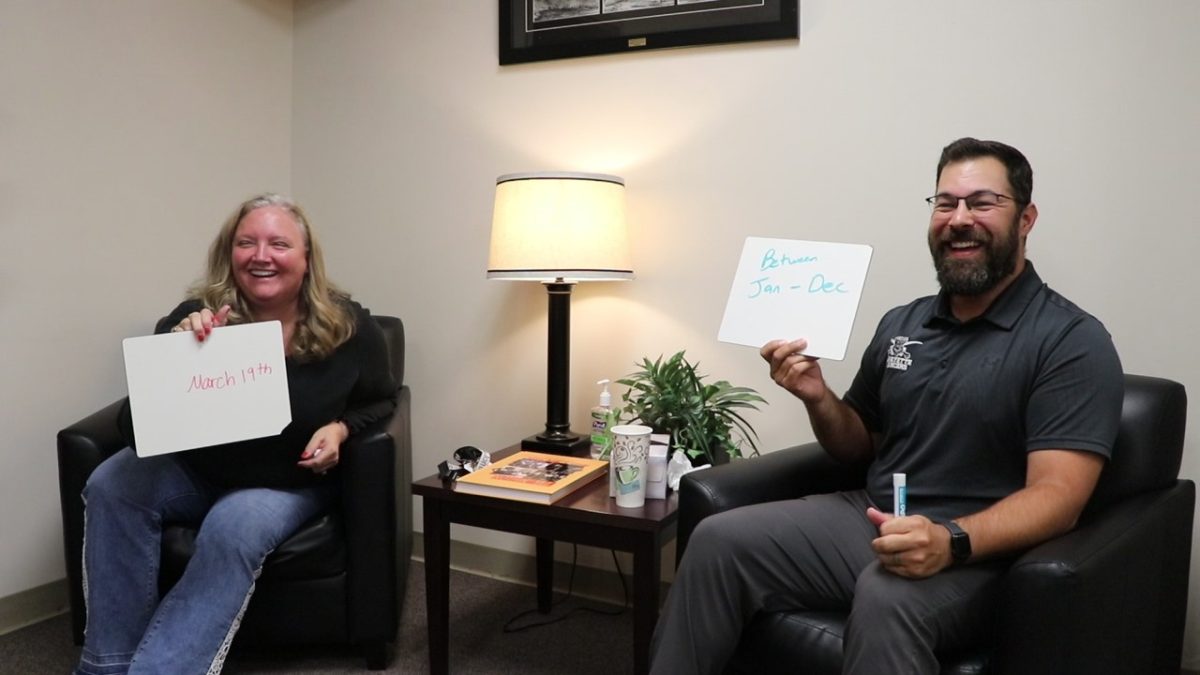Missouri program receives national attention after release of Apple TV+ Documentary

Girls State is a national program under the American Legion Auxiliary that aims to promote civic engagement, scholastic achievement and leadership among girls across the U.S.
Each state has its own Girls State program, although each program follows the same structure.
According to the American Legion Auxiliary website, the program is a week-long camp in which students form and run a mock government, participate in mock elections and attend schools of instruction in the hopes of carrying out “the program’s non-partisan governmental, patriotic and civic objectives.”
A similar program, Boys State, is hosted by the American Legion, and aims to teach citizens about “the rights, privileges, and responsibilities of franchised citizens,” according to the American Legion website.
In 2022, for the first time in both Missouri Boys State and Missouri Girls State history, the programs were held on the same campus at Lindenwood University.
2022 also marked the filming of the Girls State program for a documentary titled Girls State, released in January of 2024.
Acting as a “sibling” film to Boys State, released in January of 2020 about the Texas program, Girls State follows students participating in the Missouri program after leaked Supreme Court opinion drafts alluded to the overturn of Roe v. Wade.
Following the release of the documentary, the program received criticism online for the differences between Boys and Girls State.
MSNBC Legal Analyst Jill Wine-Banks posted on X, “I saw this documentary, Girls State, and met one of the stars of the film and its Director. It is mesmerizing, but the big takeaway was the SEXISM. I wonder if the funding differential has been eliminated now. Anyone know? If not, I’m ready to sue them. Who’s with me?”
Another X user, founder of Moms Demand Action, Shannon Watts, posted “Great documentary but the sexism is astounding. The girls have a dress code, the boys don’t. The girls sing songs and dance, the boys don’t. The boys, who have three times the budget, are sworn in by the actual Governor of Missouri, the girls aren’t.”

From the first year of co-hosted State to the filming of the program, Macae Mickens, Director of Missouri Girls State, has helped plan, adapt and execute State.
While Mickens has heard critiques of the program, she said it has never been State’s intent to control or put down girls, but to prepare them for their future. Many of the disparities between Boys and Girls State come from tradition and each program’s parent organization, Mickens said.
Since the release of the film, Mickens said she has tried to talk to viewers to answer questions and clear up any confusion.
“We maintained a very open environment for the film to be authentic, and year one of a co-hosted program, hosting a documentary crew of almost 50 people, was a lot,” Mickens said. “We were on a new campus and we co-hosted for the first time, it was hard, I’m not going to pretend like it was a walk in the park.”
Since filming in 2022, Mickens said that both Boys and Girls State programs have grown.
“The way that our programs have evolved, even just since the filming of the documentary, is a true testament to why our programs are important. Because we constantly reflect and think about how we can grow just like we’re asking young men and women from across our state to do,” Mickens said.
One way in which the programs have changed is through co-hosted schools of instruction, implemented in 2023.
Previously, Mickens said instructors would do twice the work, teaching the same content to students from Boys State and Girls State at separate times. However, in 2023, the programs decided to streamline instruction by allowing for co-ed classes.
“It’s still the same instructional staff, but they’re [teaching] in one swoop of the instructional time, in classes with both Boys State citizens and Girls State citizens,” Mickens said. “There’s value in an all-boys program and in an all-girls program, but there’s also value in getting together and having something combined to promote an elevated education experience.”
As of 2024, all nine schools of instruction are co-hosted between Girls and Boys State, with “super staff” that aid in the planning and execution of both.
“I think we’ve found a really good sweet spot,” Mickens said.
Within the documentary, Girls State citizens pointed out different disparities between the two programs from funding to the overall culture.
The academics and structure of each program remain fairly similar, citizens of each program create their own mock government with executive, legislative, and judicial positions, attend schools of instruction and participate in different activities. These activities can be co-hosted such as when a guest speaker is brought in, or exclusive to each program like the mock elections that take place.
“The main goal of both programs is promoting democracy within our youth and encouraging them to be an active part of their own communities and future roles within our government. Whether that be public service, going out and voting or maybe serving on an appointed board or commission within their community,” Mickens said.
Overall, Mickens is proud of the documentary, but always encourages those who watch it to reach out for more information about the programs.
“It’s part of the story, not the whole story. So that’s why [I like] having conversations with people after they view the film, talking with them about ‘which character resonated with you’, ‘what’s the part you enjoyed’, or ‘what’s the part you had a question about’ and just using it as a promotional conversation to help them further understand more about the program,” Mickens said.
Elected to the Girls State House of Representatives, senior Patty Kirtley also attended the program in 2023 and enjoyed the bonds, knowledge and experience she gained.
Even though she noticed some differences between Boys and Girls State, Kirtley still enjoyed her experience.
Not only did Kirtley like how rigorous it was but she especially liked meeting new people and being pushed out of her comfort zone.
Kirtley served as a member of the House of Representatives, which she said was an experience she was grateful for. The House of Representatives was made up of 50 girls who could propose new policies.
“My bill was actually the first to be proposed. I had to stand in front of everyone and talk about it and answer questions. I was just proud of myself,” Kirtley said.
Along with being in the House of Representatives, Kirtley chose to be part of the education policy class. She said that people take a test at the end to earn college credit.
One moment that stuck with Kirtley was her final meeting at State when there was a storm, causing dinner to be delivered to each dorm room, rather than eating it in the dining hall like normal.
“That was very bonding,” Kirtley said.
Kirtley also noticed some differences between Boys and Girls State.
“There [were] definitely a lot of people complaining about how it’s unfair that [Boys State] was funded by the state and Girls State isn’t,” Kirtley said.
Not only were there differences in funding, but Kirtley also said that girls got treated differently than boys.
“There was an economics class and I had a friend in it. There were only two girls and [around] 50 boys and they were complaining because the boys were just mansplaining stuff to them the whole time,” she said. “The teacher wasn’t really acknowledging the girls because that field, I guess, is male dominant.”
Overall, Kirtley still believed that Girls State was a positive experience and even keeps in touch with some of the friends she made while at Lindenwood.
While members can return the following year as a counselor, Kirtley does not plan on doing so.
Senior Vedika Kumar decided to apply for Girls State because of an ROTC tradition, where both boys and girls apply to their respective programs.
While she was there, she participated in the law school.
“[Girls State is] a great way to get to know people and to know how your government functions,” Kumar said.
Kumar described the structure of Girls State as a fully-functioning mock government comprised of multiple different levels.
Dorms represent civilization, with each floor in the dorms serving as a city.
The government is made up of two parties, Nationalist and Federalist, with roommates being from the opposite party.
When she was at Girls State, Kumar decided to participate in their law school.
“You had to take a mini bar exam and, after that, you got to be a lawyer, do cases, write briefs and argue in a court which was super fun,” she said.
One special moment she remembered was when she got into a lawsuit battle with another city.
“They falsely accused us of something and then we sued them. It just went back and forth, and then we stole their mascot. It was a great time,” Kumar said.
Besides the classes, Kumar said Girls State was like a giant sleepover. Although she didn’t know anyone when she arrived, she left State with new friends.
“I talk to two of [my friends] about F1 all the time. One of them goes to Eureka, and every time I see her we just talk and catch up,” Kumar said.
Kumar also ran for County Attorney, meaning she was in charge of managing lawsuits between counties. She eventually got moved down to City Attorney because the position was open.
Classes were the only times that Boys State and Girls State would intermingle, Kumar said. She said that the boys seemed more chaotic whenever the two were combined.
“I think [the boys] had a little more time in their schedule to relax. Girls State was meetings, clubs and classes 24/7. You didn’t really get time for yourself,” she said.
Kumar said that Girls State isn’t stricter, but more organized. Nonetheless, she said she still had fun.
Even though she hasn’t seen the film herself, Kumar said she has friends who have seen and enjoyed it. They believe that what they saw in the film was an accurate representation of their experiences.
“[The documentary] is very indicative of everyone’s experiences,” she said.
Although he attended Missouri Boys State, Lindenwood University’s co-hosting of both programs allowed senior Andrew Baca to compare his experience with that of Girls State attendees.
Baca started Boys State feeling reluctant. While he initially thought it would be another ordinary summer camp, it ended up being one of his favorite high school experiences.
One thing Baca enjoyed was that Boys State offered multiple different schools. Some of those schools included business, commerce, law, journalism and education.
“Everyone [had] different positions, catering to whatever needs or interests they had. I did business school, which was really fun,” Baca said.
During his time there, Baca participated in various activities that Boys State had to offer, including guest speakers, mock elections and making advertisements for his business course.
“The activities we did really taught me a lot about confidence and being able to express myself a lot better,” Baca said.
One thing he liked especially about being part of the business school was being able to start his own business. Through those businesses, they were able to earn Boys State Cash, which was the currency there.
“We had that feeling of entrepreneurship,” Baca said.
Another experience that stuck with him was when Andy’s Custard representatives came to Boys State, and business students could apply to start their own franchise to sell ice cream or custard.
Along with being in the business school, Baca also served as the County Treasurer in the mock government.
“There was a lot of freedom with it and you also got to work together with a lot of people at the same time,” he said.
On top of the activities, Baca enjoyed getting to meet new people while at Boys State.
“Every single person there came from a different walk of life, whether it was all the way out in the country, down in the city or anywhere in Missouri. Everyone had different experiences and desires of what they wanted to do there,” he said.
During his time at Lindenwood, Baca didn’t see Girls State often. When he did see them, he said their program seemed more disorganized.
“From experiences that I heard, [Girls State] moves a little more freely. The elections weren’t as constructed and there wasn’t a lot of structure,” Baca said.
Despite this, he said that Girls State was more social and collaborated on a lot more things than Boys State did.
“They were open to doing more stuff than we were,” he said.
He also liked seeing the Girls State citizens in action.
“They still ended up getting stuff done and it was really powerful seeing them do things better than the boys,” he said.
Even though he can’t attend Boys State again, Baca wishes that he was able to.
“In the end, I made some lifelong friends through it,” he said.
Your donation will allow our student journalists to continue their work. You may become a PATRON by making a donation at one of these levels: White/$30, Black/$50, Gold/$100. Patron names will be published on the website and once per quarter on our social media accounts.














